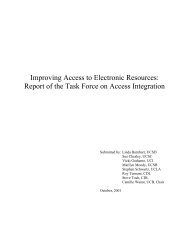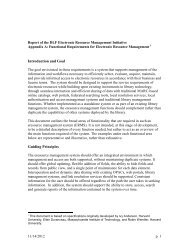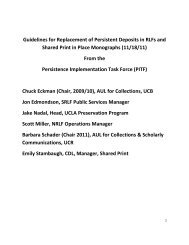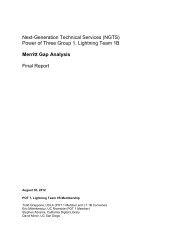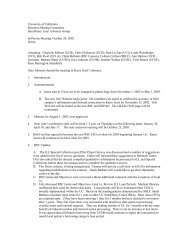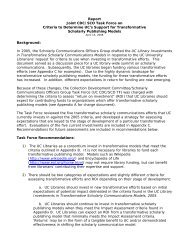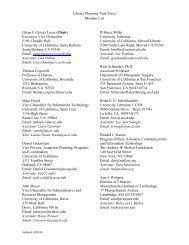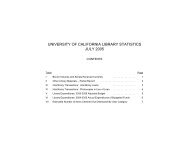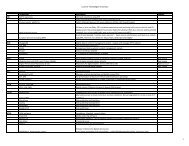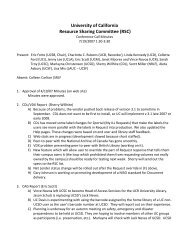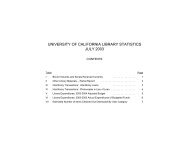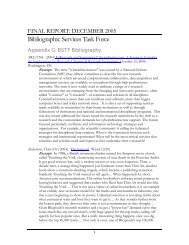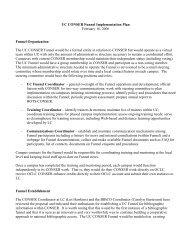The University of California Libraries: A Plan for Development (1977)
The University of California Libraries: A Plan for Development (1977)
The University of California Libraries: A Plan for Development (1977)
Create successful ePaper yourself
Turn your PDF publications into a flip-book with our unique Google optimized e-Paper software.
96 <strong>The</strong> <strong>University</strong> <strong>of</strong> <strong>Cali<strong>for</strong>nia</strong> <strong>Libraries</strong><br />
Because <strong>of</strong> the imbalance and cost, the system is becoming less<br />
and less effective. As pointed out in Chapter III, the large libraries<br />
are expected to provide the service without compensation,<br />
regardless <strong>of</strong> any imbalance, so there is no incentive to assign a high<br />
priority to the activity. Efficiency in filling interlibrary loan<br />
requests merely encourages more requests, until the increase in<br />
workload causes the service to deteriorate to the point that requests<br />
are again discouraged.<br />
Filling free interlibrary loan requests has always been<br />
treated by the large net lenders as a troublesome extra,<br />
and this, along with the cumbersome nature <strong>of</strong> the decentralized<br />
system, accounts to a large extent <strong>for</strong> the<br />
relative slowness and inefficiency <strong>of</strong> this activity in<br />
the U.S. 16<br />
Not surprisingly, a few research libraries are beginning to charge <strong>for</strong><br />
the service. <strong>The</strong> effect is likely to increase the load even more on<br />
those libraries which still provide the service free, and if <strong>for</strong> no<br />
other reason than a defensive one the <strong>University</strong> <strong>of</strong> <strong>Cali<strong>for</strong>nia</strong> libraries<br />
should consider instituting such charges. Clearly, a national agreement<br />
on a standardized fee is needed, but attempts by such organizations as<br />
the Association <strong>of</strong> Research <strong>Libraries</strong> to devise a fee system have so<br />
far been unsuccessful. If an increasing number <strong>of</strong> individual libraries<br />
begin charging on their own, however, this may serve as a sufficient<br />
goad to produce a national agreement.<br />
Some kind <strong>of</strong> national system is clearly needed, because no library,<br />
nor even a system such as proposed <strong>for</strong> the <strong>University</strong> <strong>of</strong> <strong>Cali<strong>for</strong>nia</strong>,<br />
can expect to meet all <strong>of</strong> the legitimate library needs <strong>of</strong> its users.<br />
In economic terms a national system is also desirable, because as<br />
Williams' study has pointed out, "it is apparent that <strong>for</strong> every publication<br />
there is some frequency <strong>of</strong> use at which it becomes cheaper<br />
<strong>for</strong> the library to borrow, or photocopy, it from another institution<br />
than to acquire and maintain its own copy." 17<br />
16 De Gennaro, "Austerity, Technology, and Resource Sharing: Research<br />
<strong>Libraries</strong> Face the Future," Library Journal, v. 100 (May 15, 1976),<br />
pp. 921-922.<br />
17 Gordon Williams and others, Library Cost Models: Owning Versus<br />
Borrowing Serial Publications, Office <strong>of</strong> Science In<strong>for</strong>mation<br />
Service, 1968, p. 1.



